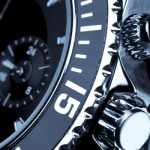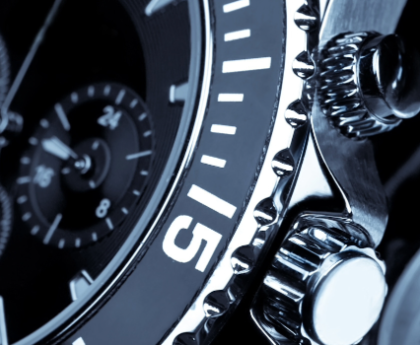
‘London has become a jungle, right? Anyone with anything nice risks having it taken.’ Bobby, the manager of one of Hatton Garden’s watch shops, does business in a windowless room as far from the street as possible, watched over by a thickset guard and a couple security cameras. ‘I’m a paranoid person,’ he says, and he’s right to be. While the level of general theft in London is going down, more and more luxury watches are stolen every year – tens of millions of pounds’ worth.
There’s no sophistication to stealing a watch. Gangs smash into shops with machetes or rip them from wearers’ wrists. Last week, Oliver White, a watch broker in south-west London, had £3 million worth of watches stolen. Two men convinced him to show them some of the shop’s stock, before one got him in a chokehold as the other filled a backpack. The pair escaped and Oliver killed himself a day later.
Why do people still pay a fortune for expensive watches, when there’s every chance they will be stolen?
Bobby is understandably jumpy. The customers who do business with him – often rappers and footballers – are led to the hidden room to do deals. Bobby has more than 100 watches for sale, including a diamond-encrusted and solid gold Audemars Piguet (price on application) and a rose-gold Rolex Daytona with a rainbow ring of gems set in the bezel (£45,000).
It’s obvious why muggers and burglars have turned their attention to watches. They only need to know a few models to make a lot of money. A Rolex GMT has, for instance, a fat metal case and a bezel in one of two colourways: red and blue or blue and black. A Richard Mille (around £200,000 new) has a big hexagonal watch-face and doesn’t have a dial. The inner workings can be seen through the front glass. Richard Milles are always attached to the wrist with a rubber, not a metal, strap.
There are long waiting lists to buy new luxury watches from official shops, so thieves meet demand by selling stolen watches to second-hand traders. Rolex used to keep track of the serial numbers of its stolen products, but it doesn’t bother any more. It’s made it even simpler for a thief to sell stolen pieces on the black market.
The guys in Hatton Garden say they have no idea how stolen watches are circulated around London. Down in The Arcade, where second-hand watch traders sell, a guy named Foday says he’d never touch a black-market product. He’s got a couple of hundred thousand pounds’ worth of watches in front of him when we talk. ‘People would think stolen watches would flood back into our hands… That’s what everybody would think.’ Others say that’s often exactly what happens. ‘There are guys here who are…’ Bobby starts, then stops. ‘Watches could end up circulating back to Hatton Garden, and then be exported. There is a black market.’ Hatton Garden has been London’s diamond district for centuries, and it’s always been a little lawless. In the Costa coffee shop across the road from The Arcade, diamond dealers sometimes meet to trade.
Why do people still pay a fortune for expensive watches, when there’s every chance they will be stolen from them later on? Pop culture is partly to blame. Young people see rappers with ‘bust-down’ Rolexes, Patek Philippes and Richard Milles and want a bit of this luxury lifestyle for themselves. (‘Bust-down’ is dealer-talk for ‘diamond-encrusted’.) ‘You’ve got a new wave of youngsters coming here,’ says the son of one watch repair shop owner. Watches are becoming cool, he says. He shows me a fake solid-gold Rolex that was brought in for a service.
Dealers say that the kids started arriving after Covid. Some of them got rich from cryptocurrencies, others from reselling designer clothes from brands like Supreme and Off-White. Online influencers are teaching kids they need to have a ‘side hustle’ to make a serious living.
I watch as a group of twentysomethings pull up in a pair of matching yellow 4×4 Lamborghinis. They park without paying. There are other kids dressed in balaclavas and tracksuits loitering between the shops. No one seems to know what they’re up to, but you get the sense it’s probably not good. ‘To see those kinds of people just floating around, it does make you a little bit uneasy,’ Bobby says. ‘I’d rather not have so much riffraff around.’
During a recent trade talk, a group of wealthy Indian businessmen told David Lammy, the shadow foreign secretary, that they didn’t want to visit London because they were so scared of being robbed. ‘You can walk anywhere in Delhi and you won’t be mugged,’ one said. They have a point. A couple of years ago, the boxer Amir Khan had a £70,000 Franck Muller watch taken at gunpoint after visiting an upmarket halal restaurant in Leyton, east London. ‘Customers’ spotted his expensive watch and alerted a local gang. When Khan left the restaurant, a car screeched up beside him. Two robbers pulled the watch off his wrist and fled.
Some think owning an expensive watch is a risk worth taking. Bobby had a footballer in his shop earlier in the day, picking up a piece he’d bought. Sitting in that windowless room, the man was safe. When the purchase was complete, he left the shop and got into a car – quickly.



